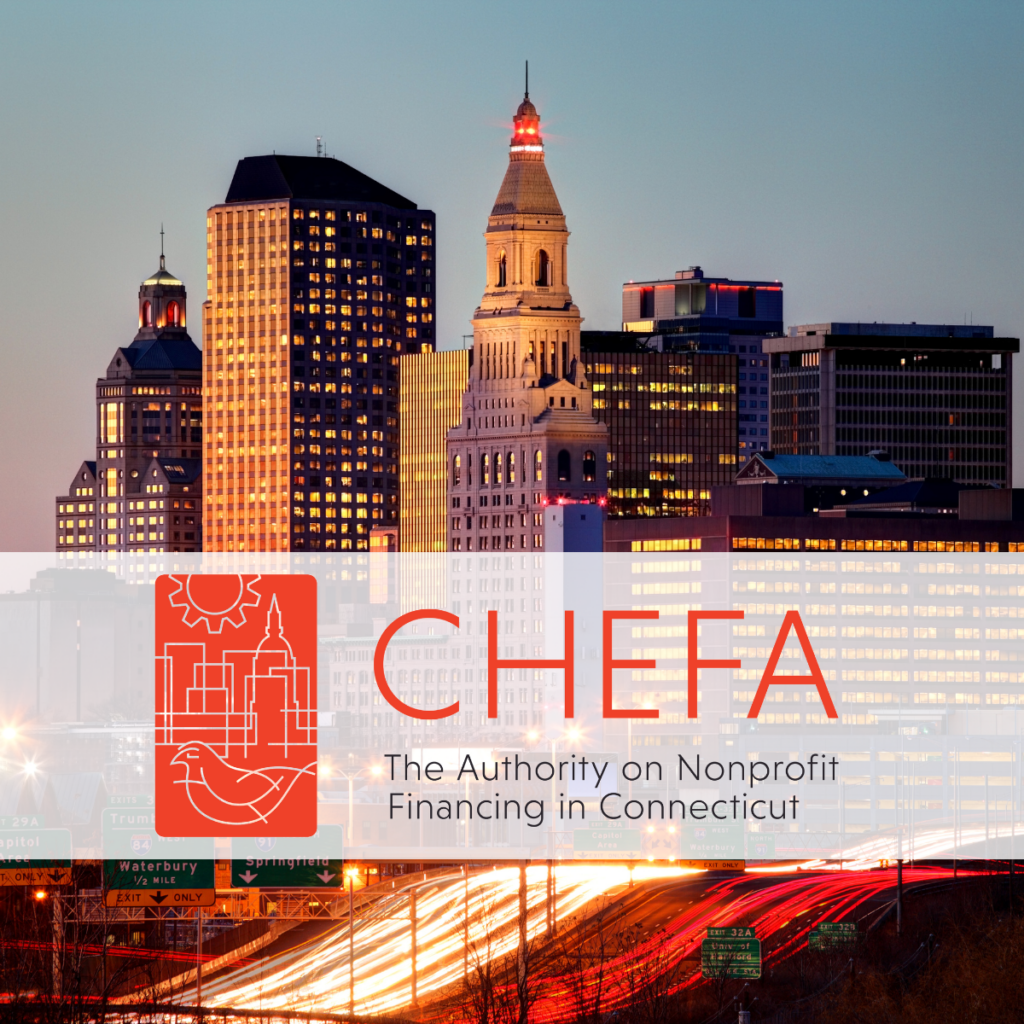CHEFA INSIGHTS for July 2023
Insight Highlights
Connecticut Legislative Session 2023: A Productive and Engaging Session for CHEFA
How CHEFA is Supporting and Funding Initiatives to Increase Community Health Workers Throughout Connecticut
CHEFA Board of Directors Approves $30 Million Bond Issue for Brunswick School
Ask the Experts: Municipal Bond Market Updates 2023
FY 2023 Hospital Sector Annual Review

Connecticut Legislative Session 2023: A Productive and Engaging Session for CHEFA

The 2023 legislative session in Connecticut proved to be a lengthy and eventful period, running from January 4th to June 7th. With a total of 3616 pieces of legislation introduced, it was a session that witnessed a significant increase in bills impacting or naming CHEFA and its subsidiaries.
Out of the vast array of legislation introduced, 25 pieces were directly related to, or named CHEFA and/or its subsidiaries. These bills were spread across six different committees, including Higher Education, Banking, Finance, Revenue and Bonding, Government Administration and Elections, Human Services, and Aging. This increase in the number of committees engaging with CHEFA indicates a notable growth compared to the previous year’s session, which saw only 12 pieces of legislation impacting or naming CHEFA, and three committees actively engaging on CHEFA related legislation.
This increase in activity is a clear indicator that our outreach efforts are working. Furthermore, these efforts have positioned CHEFA as a reliable source of information within the legislature and the broader community and are establishing the organization as a significant player in the legislative decision-making process.
The increased presence of CHEFA was exemplified by its engagement with committees such as Human Services and Aging, which have not pursued legislation related to CHEFA in recent sessions. This expansion demonstrates CHEFA’s growing influence and recognition within the legislative landscape.
Prior to the start of the session, CHEFA proactively reached out to legislators, initiating its outreach efforts in early November, shortly after the 2022 General Election. This proactive approach has paid off, as a growing number of legislators now contact CHEFA preemptively before drafting or filing legislation related to the Authority or its subsidiaries. This demonstrates that CHEFA is becoming a well-established source of information, trusted by lawmakers when dealing with matters involving CHEFA and its subsidiaries.
Notable bills and initiatives that that received final passage in the 2023 legislative session include:
SB 1104 – Priority Bill, CHEFA Proposal:
One of the prominent pieces of legislation was SB 1104, a priority bill introduced by CHEFA. This proposal eliminates outdated and obsolete provisions within CHEFA’s enabling statutes, streamlining its operations, and ensuring efficiency. Additionally, the bill expands the definition of projects eligible for financing. This will enable CHEFA to extend its financing activities beyond traditional brick-and-mortar initiatives.
HB 5441 – Student Loan Subsidy Program and ADTLS Expansion:
Another significant bill, HB 5441, establishes a student loan subsidy program specifically for police officers in distressed municipalities. Additionally, it expands the existing CHESLA Alliance District Teacher Loan Subsidy Program to include paraprofessionals and counselors in alliance districts, effective from January 1, 2024.
While the police officer loan subsidy program did not receive funding during this session, the funding for the expansion of the ADTLS program was already secured through the State Bond Commission’s authorization in 2022. As a result, the ADTLS program expansion will proceed as planned, utilizing the allocated bonding resources. CHESLA will postpone designing the framework for the police officer program until a funding source is identified and secured.
HB 6689 – Loan Subsidy Program for Healthcare Professionals and EMS Personnel:
HB 6689 creates a loan subsidy program for mental healthcare professionals, nursing professionals, and EMS personnel, scheduled to be effective from July 1, 2023. Although the legislation received an initial bond authorization of $10 million, final action from the State Bond Commission is still required to secure the necessary funding.
In the interim, CHESLA aims to engage with the proponents of these programs to explore the possibility of consolidating them into a single program. This consolidation would facilitate streamlined administration and potential adjustments in the future, ensuring an efficient and effective framework.
Overall, the 2023 legislative session in Connecticut marked a significant period of engagement and impact for CHEFA. With increased involvement across multiple committees, the Authority is solidifying its position as an influential participant in the legislative process. As CHEFA continues to expand its outreach efforts and establish itself as a trusted resource, its impact on the health and education sectors is set to grow even further in the future.
How CHEFA is Supporting and Funding Initiatives to Increase Community Health Workers Throughout Connecticut

Connecticut’s healthcare landscape faces numerous challenges, with disparities in access and quality of care prevalent across many communities. Community health workers (CHW) play a crucial role in improving health outcomes and promoting community well-being.
With the support of CHEFA’s grant programs that awarded close to $500,000 in FY 2023, efforts to expand the presence of community health workers are gaining momentum. By providing essential funding through our grant program, CHEFA is helping to bridge the gap and build a healthier future for Connecticut residents.
Community health workers serve as trusted liaisons between healthcare providers and community members, particularly in underserved areas. They play a pivotal role in improving health outcomes by providing culturally competent care, health education, and outreach services. Community health workers are uniquely positioned to understand and address the social determinants of health that impact vulnerable populations, leading to more equitable healthcare access and improved health outcomes.
Stamford Health, a leading hospital in Connecticut, is one of the beneficiaries of CHEFA’s commitment to enhancing community health. With a client grant of $75,000, Stamford Health is expanding its community health worker program, enabling greater engagement and support for residents. This investment will foster a stronger connection between healthcare providers and the community, leading to improved health literacy and access to care.
Additionally, Make the Road CT, a grassroots community organization, has received a grant of $75,000 from CHEFA. This funding will enable the organization to recruit and train community health workers, who will work to address health disparities within under-resourced communities. By empowering these CHWs, Make the Road CT will make strides in ensuring that individuals have access to needed healthcare resources.
The Health Education Center, another nonprofit organization, has also received a grant of $75,000 from CHEFA. This funding will enable the Health Education Center to expand its existing community health worker program and provide crucial support to under-resourced communities. By training and deploying more community health workers, the center aims to reduce barriers to care and enhance health outcomes across the state.
Moreover, CHEFA’s Targeted Grant Program award of $250,000 to St. Francis Hospital, St. Mary’s Hospital, and Johnson Memorial Hospital (part of Trinity Health) further demonstrates the organization’s commitment to bolstering community health initiatives. This significant investment will facilitate the expansion of CHW Emergency Department programs, helping these hospitals to provide care to vulnerable populations and address healthcare disparities.
While the need for more community health workers in Connecticut is evident, securing adequate funding for their programs remains a challenge. CHEFA’s grant program plays a crucial role in addressing this funding gap, enabling healthcare providers and nonprofits to expand their community health worker workforce and enhance community health services.
The presence of community health workers is vital for addressing health disparities and improving health outcomes in Connecticut. Thanks to the support and funding provided by CHEFA, organizations such as Stamford Health, Make the Road CT, the Health Education Center, and Trinity Health can significantly expand their community health worker programs. By investing in these initiatives, CHEFA is helping to bridge the gap in healthcare access, empowering communities, and fostering a healthier future for all Connecticut residents.
CHEFA Board of Directors Approves $30 Million Bond Issue for Brunswick School
We are delighted to announce that the CHEFA Board of Directors has granted approval for the Brunswick School Issue, Series E, in the amount of up to $30 million. This decision was made during the June 21, 2023 Board Meeting, marking a significant milestone in the school’s development.
The proceeds from the Series E bonds will be dedicated to the acquisition of a prestigious 16.5-acre parcel, previously known as Carmel Academy, located in Greenwich, CT. This exceptional property encompasses a collection of 15 buildings. Notably, a majority of these structures hold historical significance and are proudly listed on the National Register. With over 92,000 square feet of building office space the campus also offers an array of amenities such as playgrounds, playing fields, courtyards, and tennis courts. Brunswick also has plans to renovate up to four buildings, transforming them into 16 units of employee housing.
Plans are also underway to relocate the School’s Pre School, currently enrolling 90 boys, to this new campus. Furthermore, a cutting-edge day care facility is set to be established, catering to the needs of up to 50 infants through preschool-age children. This visionary expansion aims to bolster Brunswick’s commitment to excellence and further support their strategic goals.
The financing for this landmark land purchase aligns with Brunswick’s comprehensive capital campaign plans. It will furnish the necessary resources for essential improvements, expansion, and the overall advancement of the institution. Additionally, this strategic move will enhance the School’s ability to provide a world-class education, address the evolving needs of its student body, and cultivate a diverse community through continued support of financial aid initiatives.
JP Morgan Chase will serve as the underwriter for this transaction, which is anticipated to price and close in the forthcoming weeks.
Stay tuned for more updates on this exciting endeavor!
Ask the Experts: Municipal Bond Market Updates 2023

According to recent reports from leading financial experts, the municipal bond market has been a turbulent ride in 2023. Factors such as bank failures, rate volatility, uncertainty surrounding the Federal Reserve’s policies, and weakened investor demand have shaped the market’s performance.
Despite a strong start to the year, investors quickly encountered these challenges, adjusting to such things as the “higher for longer” policy of the Federal Reserve regarding the level of interest rates. Investors also had to adapt to an increasingly inverted municipal yield curve, resulting in a choppy and largely rangebound performance during the first half of the year.
Looking ahead to the second half of 2023, most experts anticipate a neutral performance. The typically robust summer redemption season is expected to give way to fall headwinds, primarily due to an anticipated increase in the calendar of new issuances and the lingering influence of a still-hawkish Federal Reserve. Moreover, bank demand, which has been affected by shrinking deposit bases and the disappearance of certain bank municipal securities portfolios, is expected to remain a challenging factor.
JP Morgan projects full-year tax-exempt issuance of $330 billion, along with $45 billion of taxable/corporate CUSIP issuance. Looking specifically at the second half of 2023, they anticipate tax-exempt issuance to reach approximately $178 billion, which would represent a 17% increase compared to the same period in 2022 ($152 billion). As for taxable supply in 2H23, JP Morgan expects supply to remain flat compared to 2H22, but significantly lower than the five-year average at $21 billion. June, July, and August typically emerge as the most supportive three-month period of the year as there tends to be more demand than new issue supply. On the other hand, the net supply forecasts for September and October stands at +$13 billion, indicating a jump in the amount of supply of new issuance in relation to potential demand. However, JP Morgan also emphasizes that while supply/demand technical indicators are significant, they can be easily influenced by mutual fund flows and other market dynamics.
FY 2023 Hospital Sector Annual Review
At the Board of Directors Meeting held on May 17th, Staff presented its annual review of the Authority’s Hospital portfolio, which included financial operating results for FY 2022, key utilization metrics and bond issue activity trends since FY 2019.
The financial operating performance review was based on six stand-alone hospitals (including the Parent and subsidiaries) as well as the four in-state and multi-state health care systems (collectively the “Institutions”), which includes 17 hospital facilities. Utilization trends were based on 23 hospitals on an individual basis that comprise the hospital sector portfolio, consisting of 32 bond series with approximately $2.33 billion outstanding.
Acquisitions & Affiliations: In February 2022 Yale New Haven Health Services signed an agreement to acquire three hospitals (Rockville, Manchester Memorial and Waterbury Health) from Prospect Medical Holdings and is currently waiting for final regulatory review and approval. In March 2023, Covenant Health withdrew its certificate of need application to affiliate with Day Kimball Hospital.
Rating Agency Outlook: Moody’s overall outlook of the not-for-profit healthcare sector for 2023 (issued on Dec 7, 2022) remains negative as difficult operating conditions continue through labor shortages, high inflation, supply chain issues and only modest revenue increases. Fully repaid Medicare advances in 2022 also contributed to a reduction in cash reserves. Hospitals with weaker cash cushions or exceptionally large operating losses will face increased risk of covenant failures and may need to liquidate investments to boost debt service coverage or draw on lines of credit to temporarily increase cash.
Utilization: FY 2022 utilization has trended favorably among total patient days (up 0.8%), ambulatory surgeries (up 4.2%) and emergency room visits (up 11.1%) for the majority of the hospitals within CHEFA’s portfolio from FY 2021, but overall, continues to lag pre-pandemic levels within some areas.
Operating Performance: FY 2022 operating results were mostly unfavorable with five of the ten Institutions experiencing a negative operating margin, averaging -2.3%. The portfolio operating margin median declined from 2.6% in FY 2021 to 0.2% in FY 2022 and is at its lowest level over the past five years. The operating margin median calculated on the 23 hospitals individually (excluding the Parent and subsidiaries), compared favorably to Moody’s preliminary 2022 Median. The operating cash flow margin median also declined from the prior year (from 7.7% to 5.8%). The FY 2022 debt service coverage ratio median decreased from its high of 5.3 times in FY 2021 to 2.3 times in FY 2022 and is at its lowest level over the past five years with four Institutions having less than 2.0 times coverage.
Liquidity: Mostly attributable to unfavorable market performance in FY 2022, the days cash on hand median of 136.8 days decreased from 178.4 days from the prior year and is at its lowest level over the past five years. The range varied among the Institutions (from 41.9 days to 317.0 days) with only one Institution surpassing Moody’s overall Median of 210.4 days. The cash-to-debt median in FY 2022 declined from its five-year high of 191.1% in FY 2021 to 155.9% in FY 2022 with eight of the ten Institutions reporting a decline from the prior year.
Capital Investment: Despite the increased cost of capital and inflation, total aggregate capital spending increased 11.5% from FY 2021 to FY 2022, and the median increased 55.2% from the prior year. While total capital spending of $672.0 million is at its second highest level over the past five years, it still significantly lags its high of $831.8 million from FY 2020. A substantial disproportion in capital spending exists among the hospitals based on the size and financial strength of the Institution. Average age of plant increased from the prior year and remains high at 14.1 years compared to Moody’s overall median of 12.3 years.
To learn more about the CHEFA Hospital Sector report for FY 2022 and the performance of 23 hospital facilities that make up our hospital portfolio, please contact Michael Morris, Managing Director at mmorris@chefa.com.